'Home Can Never Be Home If There is No One There to Make It So' – A Palestinian Story
Lifestyle
|
Nov 11, 2023
|
12 MIN READ
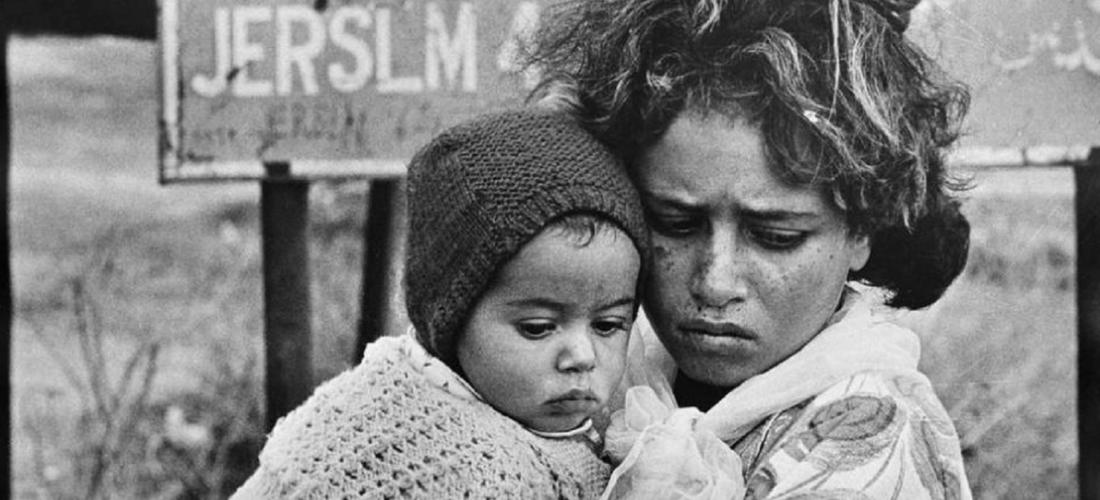
Palestinian woman arrives at a refugee camp in Jordan after fleeing Palestine in 1967; Image source: libcom.org
Author's Note: This story is a historical fiction based on years of stories that I have heard told about Palestine, through the mouths of Palestinians. I pray that this helps you see the world in a different light because all stories have more than one side. Peace be with you all.
By Mona Banawan El-Haj-Mahmoud
Suburban America 2008
Dusk was nearing. The birds whispered to the setting sun their goodnights. The old man’s rocking chair creaked. The wind breezed through his thinning moon-kissed hair. His legs hurt him today more than normal. He warily sat on the porch and hoped that the aching in his knees would subside with the rhythmic back and forth of his chestnut colored rocking chair. The gentleman’s age was undisclosed … even to himself.
You see, he came from a place where birthdays were forgotten, and papers were forever lost. The children in the neighborhood were used to hearing his stories every Saturday – it was a tradition from before anyone could remember.
They got to his house by bike or walking, some even ran as not to miss his stories. They clambered onto his wraparound porch, sat around his age-wary ankles. The soft lines of his face were unusually deep. His forehead was molded into waves of thought. “What’s wrong?” a couple of the children asked. “I will be fine,” he reassured them.
He began his story with “Once upon a time,” as he always had. This time though, he opened his mouth and started to sing a song:
“O, flying bird in the high sky / Say "hello" to the dear sweet one / Your name, my soul, will stay in my mind / Written on my forehead between the eyes.”
His voice broke off. It was as if years had passed since he’d sung these words to anyone in the living world. He sat quietly and the children looked up at him with eyes full of awe of his resplendent voice. They had never heard him sing, and for the slightest second it seemed like everything around them had stopped just to listen.
Slowly the children began to talk again, they chirped like little excited finches when they heard him sing. “Why don’t you sing to us every Saturday?” one little girl asked. He smiled back and thought of what they might have thought of his voice when he was younger. People called him the “Song Bird of the Village.” Someone with a voice so sweet, couldn’t go unnamed.
Sitting deeper into his rocking chair, Old Man Zackery continued to narrate a story that started so many years ago. “Today’s story is about the day that I met Sarah. Sarah was a girl with exquisitely mesmerizing hazel eyes and dark lush curls. She had a personality that spoke volumes to her linage. She was very smart, lively, and always, I mean always stood up for what she believed in.
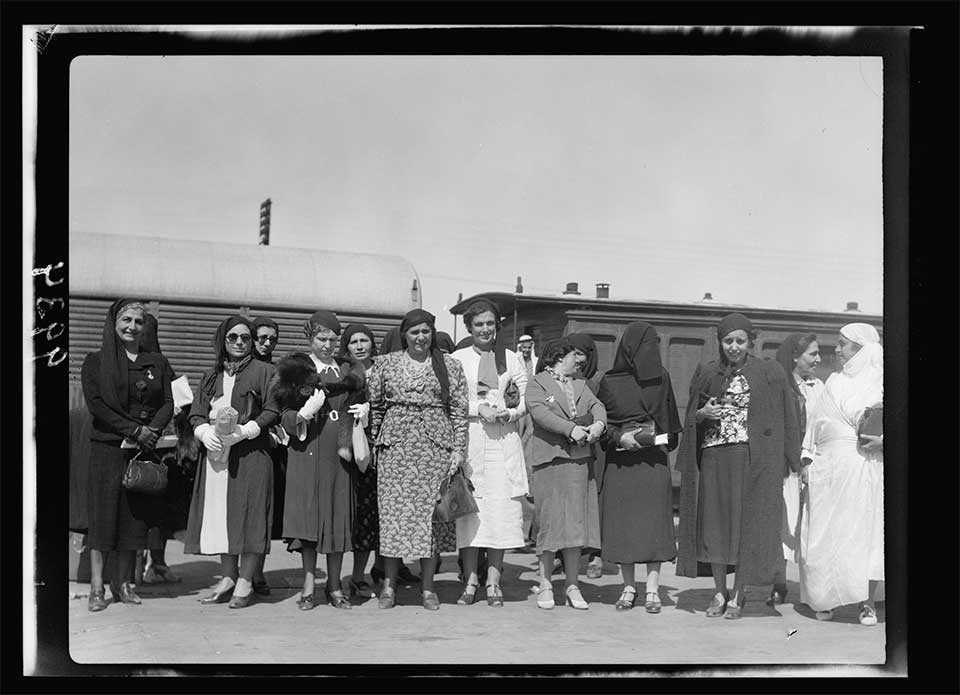
A delegation of Palestinian women at the Lydda (Lod) Junction leaving for the Eastern Women’s Conference for the Defense of Palestine in Cairo, October 12 1938; image source: Matson Photograph Collection / Library of Congress.
"Our village was on the coast. It was called the “Bride of the Galilee.” I still remember how peaceful it was there. A little like our town,” he said looking down at them. “We were farmers back then with little worry of the outside world ever piercing our comfort. The valleys were green and the olive trees were even greener. Everyone knew everyone and everyone’s kids belonged to the whole village.
"I met Sarah in 1946, two years before the world would change forever. I was on my lunch break. I always love to have my breaks on the pier. She was on an outing with her friends at the beach. I was 20 years old and ready for life to start. She was 18 and just getting a true taste of being an adult. That day, I remember her wearing a white cotton dress with a thin light-yellow belt and no shoes. Her feet kissed the water of the sea as she twirled around and laughed with her friends.
"I remember the wind playing through her waist long curls. She lived near my old house, just a few streets over. Later that night we were both invited to a mutual friend’s house. I couldn’t wait to see her.” He looked down at the eager eyes and winked, “I knew she was going to be my wife. One week later I asked her to marry me.”
The children didn’t know what to say. They weren’t used to learning anything concrete about this man that lived alone in their neighborhood for as long as anyone could remember. He sat there, eyes full of memories. “On this day, 60 years ago I came to America.” They could finally put a timeline to him. The children could not possibly fathom 60 years passing, but at least they could tell their parents.
Before Old Man Zackery could continue, Benny whisper-shouted, “But, where’s Sarah now?”
“Dear boy, she lives on the wings of the Birds of Paradise.”
The kids didn’t know what exactly to make of what he had just said but knew that it meant that she wasn’t any where near where they lived. The sun had already set, and the children knew that this was their que that story-time was over. They thanked and hugged Old Man Zackery and went off their separate ways. “I hope Sarah comes to visit you some time soon,” one of them whispered into his ear. It was obvious the kids didn’t want their old friend so sad. Little did they know that the story continued in Old Man Zackery’s head.
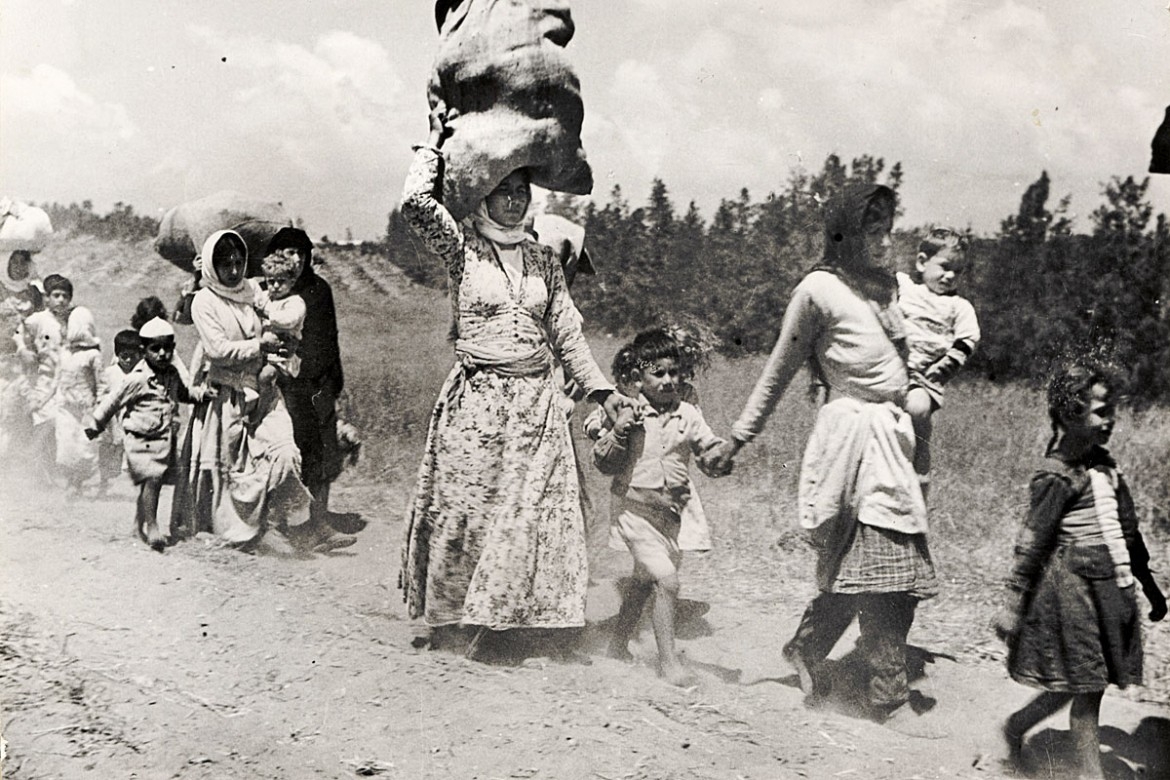
Palestine, Tulkarem district in 1948.; a group of around 1,000 people, including many mothers and children, forced to flee their homes during the first Israeli invasion. (File photo: ICRC)
He sat thinking to himself, “Oh ya Zackeira, today really is a day like no other. I can still see them in front of me. So close, yet so very far…”
Palestine 1948
Life was simple in Palestine. Everyone lived their lives happily and for the most part harmoniously. European customs trickled in slowly, appearing first in the way people dressed and matriculated later in the way people entertained themselves. Zackery, before he became Old Man Zackery, was one of the most handsome men in the village. People loved his company.
His job was a pretty simple one, he worked as a security guard for the only bank in the village. It was a quiet job, but it sure beat working the fields. He married his lovely Sarah in 1946. A few months later, they had one little girl they named Mariam.
The midwife that delivered her, Um Ali, said she was the most bright-eyed baby she’d delivered in the whole village. She was truly her mothers’ daughter. Her electric personality treaded near the surface of her everything she did. She also inherited her mother’s reddish-brown curls.
Every Friday they would spend the holy day with family. Zackery had four brothers and two sisters. Sarah had seven brothers and three sisters. Everyone knew that little Mariam was spoiled beyond belief, but in a good way. They would spend their Friday nights on the rooftop of his parent’s villa.
There was a cushioned pillow sectional along the roof of the two-story house. The roofs were flat, that made for an excellent place to have tea and chat or play a good game of backgammon or chess. His family grew grapevines on a large wooden lattice. Grape leaves made some of the most delicious meals in the Arab cuisine.
He liked a laid-back kind of life. A life with no worries. A life where people lived to be happy, to share and to love. The past two years were as they should have been, full of joy and life and best of all, with Sarah by his side.
She worked for the newspaper. It wasn’t normal to see women employed at the paper but she wanted to make a difference. She would always tell her husband that she, “wouldn’t sit around as their country got stolen from under them.” She said it so often that Zackery memorized it. He even memorized how her hands flew into the air when she would say it. So much conviction for the truth. He admired her strength, but worried about her all the same.
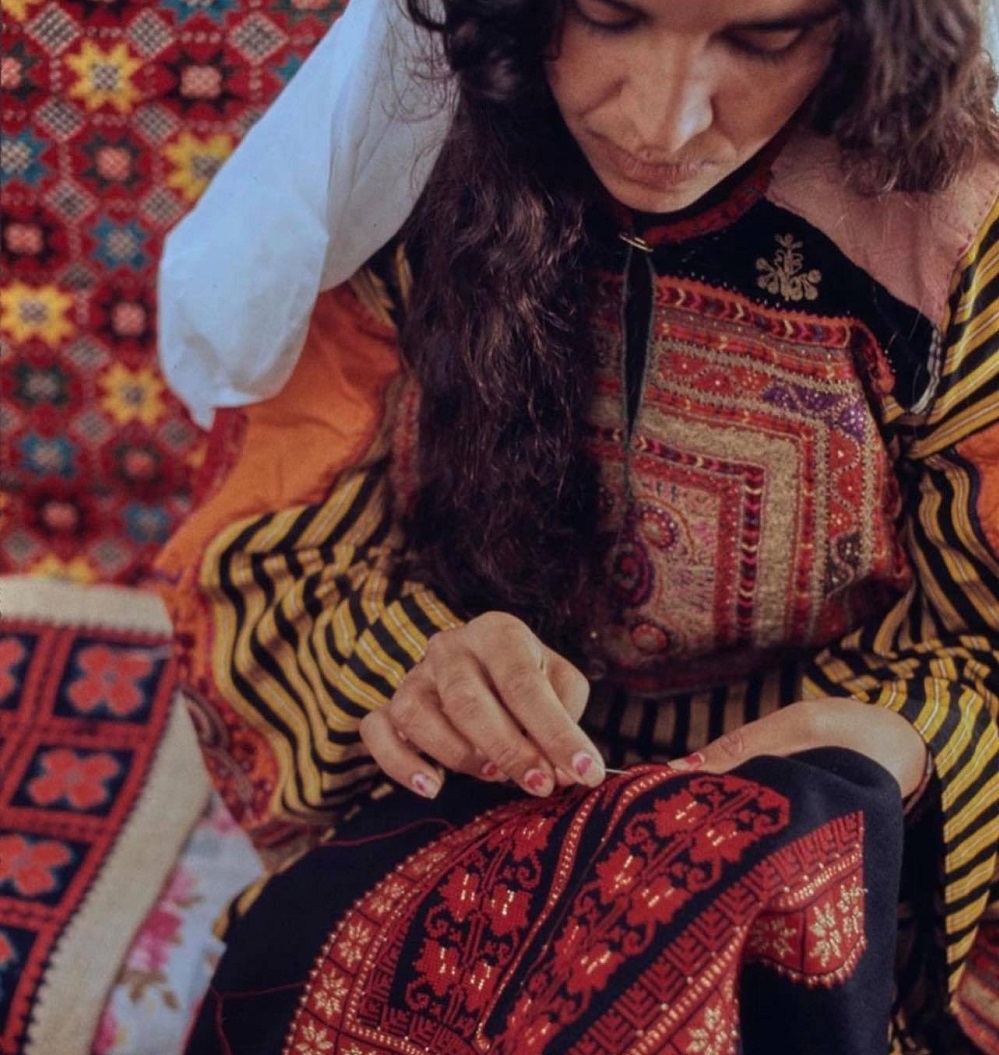
A Palestinian woman doing tatreez; image source: National Geographic Archives, Imagining the Holy Project, National Geographic December 1926.
He recalled one night, she came to him with worry in her eyes, “Zackery, something big is happening. I feel it every time a new story comes out about the new settlers. Something catastrophic is going to happen.”
“That’s what you always say my love. How about this, I’ll make us some tea so we can sit and put your mind at ease. Everything will be fine. I promise.” He remembered hugging her and the smell of fresh lemon in her hair.
He was too quick to make this promise because not a week had gone by that the whole village was set alight. He wasn’t home when it the skies above the village opened fire on them. The planes flew as close to the earth as they could without crashing. Sarah told Zackery about this this Zionist scare tactic before.
He ran home to be with his daughter and wife. He tried to phone his family, but the lines were already cut. After hanging up the phone, Sarah looked over at him and said that they needed to run. He remembered asking her if it was just a scare tactic like she said, but something in her eyes said that this was much bigger than that. The sirens sounded again, and the screams began to waft through the air. They were frightening and filled everything around them with a terror they had never felt before.
Zackery knew that the political situation wasn’t the most peaceful, and he was ashamed of himself for being so naïve. They locked up the doors of the house and they chased the heels of the people of the village. Everyone was running towards the trains.
Old Man Zackery closed his eyes as he rocked back and forth repeating to himself that he tried to go back for them. He murmured to himself, “I tried ... ” he softly cried. “I pushed. I shoved. I shouted to keep them with me, but I couldn’t. It was as if we were being swept out to sea.” The loudspeakers of the village were turned to full blast telling everyone to “leave your houses with your women and children, or you will be killed.” Planes were flying so low. He held onto Sarah’s hand and ran with Mariam in his arms.
Old Man Zackery crunched over, shoulders hovering over his tired knees, as if holding the whole world on them, the memories bore down on him, he lifted his eyes to the sky and let out a heaving silent cry, waterboarded by his own tears.
He held her hand and wouldn’t let go. He shoved people left and right to get them to safety. The train cars were wide open and full of chaos. The last car was getting fuller by the second. Sarah had taken Mariam when he jumped on to keep the doors open for them. It was their only way out.
He ran to the door to hold it open for his wife and baby to get in. His clothes got caught in the door and he was dragged into the tightly packed car. He remembered how he punched and screamed his way to get back to them, but between all the frantic limbs and loud voices, he saw them. They were getting swallowed up by the crowd. Before the doors were slammed shut, there was rapid gun fire.
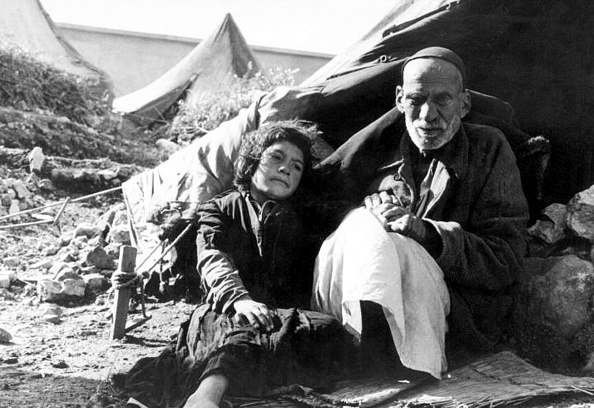
A Palestinian girl and her grandfather during the Nakba; image source: Twitter and Getty.
He rammed his head into the window of the car and saw it, he saw it all.
Sarah and Mariam were both sprawled on the ground, gunshots wounds embedded into their beautiful angelic heads. The curls were laced with blood. The train lurched forward, and all he had left was the memories of that dreadful moment emblazoned on his eyelids.
He was frantic and on the edge of sanity crammed into that small space with his eyes still not realizing the truth of what he had just experienced. People of all walks of life were stuffed into these four metal walls. Everyone was stuck in their own forms of agony. As the minutes grew into hours, he started to come around.
“This was all planned, it had to have been,” he said to anyone that would listen. “There were over 4,000 people living in this village alone.” Every so often the train would stop. He didn’t know where his mother, father, brothers or sisters were. Looking over to his right he saw his good friend Muhammad, “Did you see my family get on?” he asked.
“I saw a few of your brothers, Malik and Musa, and I think one of your sisters. Did you see my mother and father? My father is not well.” He pleaded in the dark.
“I’m sorry my friend, I didn’t see anyone but a wave of human bodies enter these cars,” He swallowed hard, “They killed Sarah and my little Mariam.” His friend grabbed him into his chest and wept so loudly the whole car could hear them. Zackery refused to speak for the rest of the trip. Those words thickened his tongue and made him feel like he went into anaphylactic shock.
As the night went on people began to hush their cries and mumblings of despair. They were all hypnotized by the sound of the tracks. There were thuds of humans jumping out of the tomb-like carts at every stop. If families weren’t together, they would possibly never be together again. No one knew where the cars were discarding their cargo.
Each stop meant a different city. The misery that filled the air as loved ones came to the realization that they weren’t together, was palpable. IDF Soldiers shouted over the chaos, people started pounding on their car doors, inside and out. With a total disregard of human safety, the train pressed on. Every few hours and more and more carts were emptied. Until it came to his turn.
He was thrown on the tracks of an old Syrian city. He couldn’t believe that Sarah was gone. He couldn’t allow himself to come to grips with that reality, so he looked for his family, his wife, his child, in complete denial of the truth, they were gone and he was alone. He swore that he would never stop looking. Sarah was his one true love, and Mariam conquered all else.
*********************
Still sitting on his porch as night filled in the void of noise, he sat thinking, of the old rickety boat, called the ‘The Emancipator.’ He came to America on it. He recalled wanting to learn about the people of this new country. He picked up an outdated newspaper and began reading the stories of the people of this new land. There was a story about a little girl named Sophie.
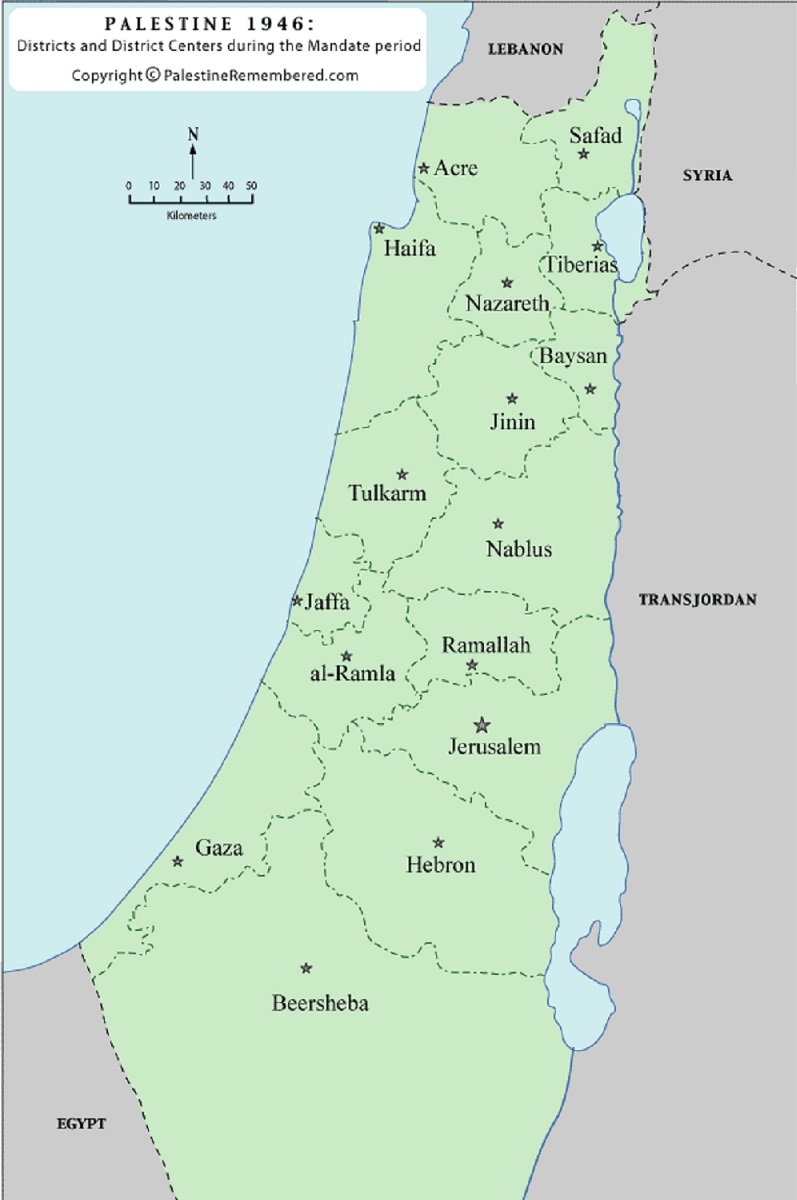
A map of Palestine in 1946.
The editorial spoke of her fright for the fireworks display on New Year’s and how her mother thought they should make fireworks quieter. For Sophie the sounds and lights were for amusement and festivity, for Sarah and Mariam they were the last things they ever saw. “They were my only family left on Earth. Sarah, my wife, and my little Mariam.”
Home can never be home if there is no one there to make it so…it cannot be home if someone else has taken it away. As he looked on he spoke to himself saying, “Unfortunately, the pleas against oppression fall upon deaf ears and blind eyes - eyes and ears that will never hear or see until the dirty green paper blindfold is lifted off of them.” Softly he sang,
“Religion has contained us in life / And only to God we complain about our suffering / No matter how long we live, we'll go back to our mother / Our dear land the mother of relationships”
A tear slowly glided from the old man’s eyes onto his cheek as he got up to leave his porch and turn off the light. All was dark, all was silent. But there was still a glimmer of hope in his mind, that maybe, just maybe his eyes hadn’t seen what they saw, and Sarah was also rocking on a rickety old chair with Mariam not too far away.
Mona Banawan is an American Egyptian. She is working on her first novel based in 1947 Jaffa, Palestine. She has been a life long activist for Palestine. Her husband is from the village of Tarshiha. It was occupied by the Zionist state in 1948. She is a proud mother of three half Palestinians children. Mona believes that the only way to victory is through God and being proponents of truth. The banner image of this story is sourced here.
Subscribe to be the first to know about new product releases, styling ideas and more.
What products are you interested in?


